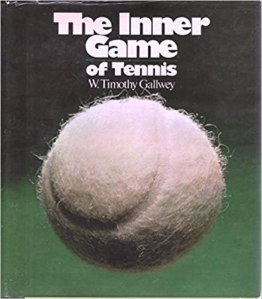 I have written before about ‘The Inner Game of Tennis’. I came across an interview on youtube with the man himself, W. Timothy Gallwey. There is no need for me to make any comments when the man can speak for himself.
I have written before about ‘The Inner Game of Tennis’. I came across an interview on youtube with the man himself, W. Timothy Gallwey. There is no need for me to make any comments when the man can speak for himself.
Here are some highlights for me. At the bottom is the link to the whole interview.
“My role was not to teach, but to help to learn. And that made a huge difference.”
We got to a place where “… coaching was facilitating learning from experience.”
Three overarching skills.
1. Increasing non judgemental awareness of what is.
2. Clarity of goal, clarity of choice. You’re not making the choice you’re following the interest of the person being coached.
3. Inspiring self trust.
The ‘inner game’ cannot not be played.
Performance equals potential minus internal interference.
The process of coaching shouldn’t be overregulated.
The coach has to keep throwing the leadership ball back to the coachee so that he is taking responsibility and accountability for the choices he is making.
Enjoyment improves performance and learning.
Learning is an inherent capability of people. You don’t have to put it into people, you have to bring it out. That’s the privilege of the coach.

What Tim Gellway is pointing out is briliant and it is certainly not specific to tennis, nor to sports. These are profound insights into the nature of human development and learning. People who like it, might also wanna read Annie Murphy Paul’s “Eight Ways of Looking at Intelligence”, which can be found on Rick Rice’s Blog: http://cgi.stanford.edu/~dept-ctl/cgi-bin/tomprof/posting.php?ID=1273
These eight ways are worked out in a different context (Higher Education), yet to me they are most illuminating for working with volleyball players as well. Here they are:
1. Situations can make us smarter.
2. Beliefs can make us smarter.
3. Expertise can make us smarter.
4. Attention can make us smarter.
5. Emotions can make us smarter.
6. Technology can make us smarter. [That’s why coaches try to help players the with stats, videoanalysis and so forth.]
7. Our bodies can make us smarter. [That might be surprising for HigherEd, but is of course kind of trivial for atheltics.]
8. Relationships can make us smarter.
The first perspective, i.e. situations, is a primus inter pares. According to Paul, people become smarter from every perspective by finding themselves in circumstances that enable learning. And this is the point, where we find the strong connection to Gellway. Coaching and preparing athlets is NOT about teaching and telling them what to do in the first place. In order to have inteligent players, it is about creating situations that facilitate the learning of the players.
LikeLike
Gallwey’s work is definitely not limited to tennis. He wrote a lot of other books to take advantage of the fame of his first 🙂
This is an interesting list. The first point about situations is clearly a key point in volleyball training. The most effective feedback is the feedback provided by the game itself. In training there must be as many of those situations as possible.
Coaching is about providing players the opportunities to learn.
LikeLike